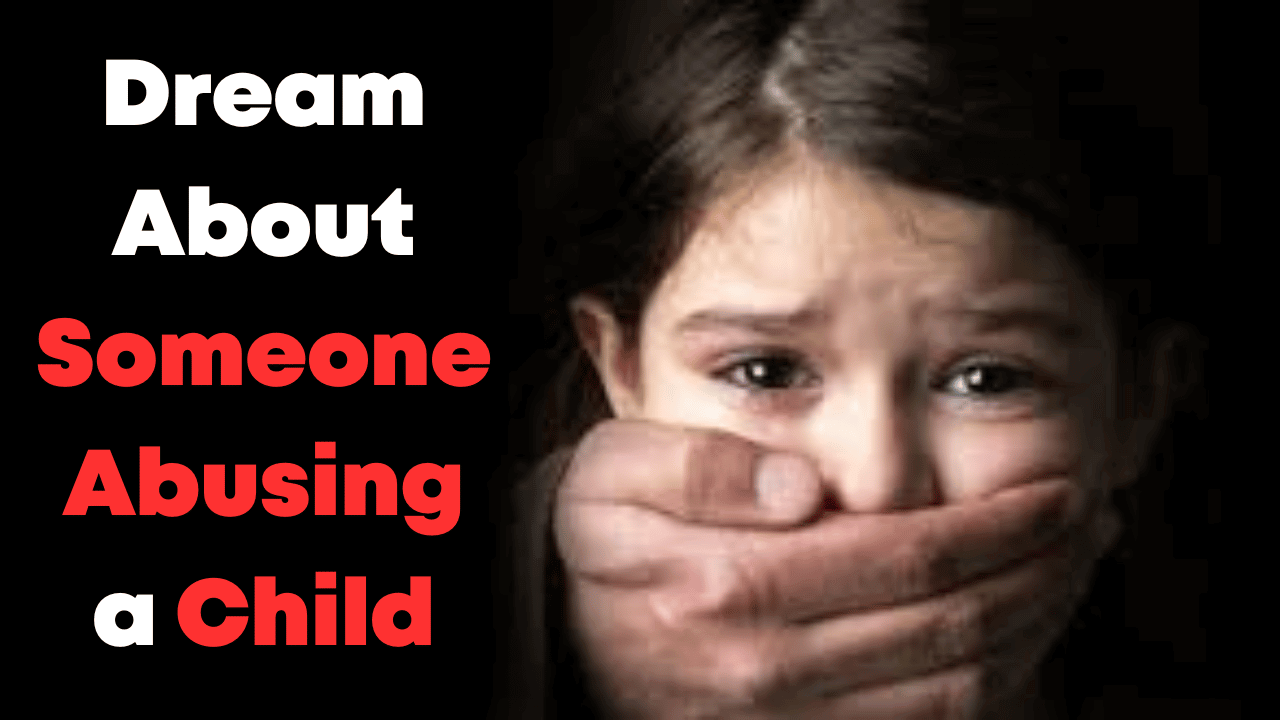Dream About Someone Abusing a Child is the mind’s way of exploring the depths of our subconscious, often revealing truths about our fears, desires, and unresolved emotions. Among the myriad of dream scenarios, one that stands out for its emotional intensity and potential for distress involves witnessing or being aware of a child being abused. Such dreams can shake us to our core, leaving us with a lingering sense of discomfort and a quest for understanding. This article delves into the complex symbolism and interpretations of dreams about child abuse, drawing on psychological, cultural, and religious perspectives to offer a comprehensive exploration of their significance.
Understanding The Meaning of Such Dreams
Dreams about someone abusing a child are not only unsettling but are also loaded with symbolic meaning. Psychologically, these dreams could represent an aspect of the dreamer’s inner child that feels neglected, abused, or vulnerable. It might signify fears of inadequacy in protecting oneself or others, or it could reflect past experiences or witnessed events that have left a deep emotional imprint on the dreamer’s psyche.
Interpreting Dream About Someone Abusing a Child
The nuances of interpreting these dreams often hinge on the specific scenarios or contexts presented. Each variation can offer unique insights into the dreamer’s emotional state or life circumstances.
- The Identity of the Abuser and Child: If the abuser or child is known to the dreamer, it might reflect real-life concerns, fears, or unresolved issues related to these individuals. Alternatively, if they are strangers, they may symbolize aspects of the dreamer’s own personality or life experience that are in conflict.
- The Nature of the Abuse: The specific type of abuse witnessed can offer clues to the dreamer’s subconscious worries or traumas. Physical abuse might symbolize feelings of powerlessness or anger, while emotional abuse could indicate neglected aspects of the dreamer’s emotional health.
- The Dreamer’s Role: Whether the dreamer is a passive observer, a protector, or even the abuser, plays a significant role in the interpretation. It could reflect feelings of guilt, responsibility, or a desire to change aspects of oneself or one’s situation.
Why Do People Experience Dream About Someone Abusing a Child?
These dreams can emerge from a complex mix of psychological, emotional, and physiological factors. Psychologically, they may surface during periods of stress, anxiety, or when the dreamer is processing past traumas or fears related to vulnerability and protection. Emotionally, they might signify deep-seated concerns about harm coming to loved ones or feelings of helplessness in safeguarding one’s inner child. Physiologically, stress and anxiety can disrupt sleep patterns, making disturbing dreams more likely.
Spiritual Interpretation of Dream About Someone Abusing a Child
From a spiritual perspective, such dreams might be viewed as messages urging the dreamer to confront and heal from their inner wounds. They could symbolize the struggle between innocence and corruption within the soul, inviting the dreamer to nurture and protect their spiritual purity. In some traditions, these dreams could also be seen as a call to action, urging the dreamer to extend their protective instincts towards others in their community or society at large.
Biblical Interpretation of Dreams About Someone Abusing a Child
Biblical interpretations often focus on the themes of protection, innocence, and moral integrity. Dreams about child abuse could be understood as a divine prompt to examine one’s life for areas where one might be causing harm—whether through action or inaction—to the innocent or vulnerable. Such dreams could also serve as a stark reminder of the biblical mandate to protect and nurture those who are unable to protect themselves, emphasizing the importance of compassion, righteousness, and justice in the dreamer’s waking life.
Religious Interpretations of Dreams About Someone Abusing a Child
- Islamic Interpretation: In Islam, dreams are considered a significant part of one’s spiritual life, with some viewed as messages from God. Dreams about child abuse might not have a direct interpretation in Islamic texts, but they could be considered a reflection of the dreamer’s inner turmoil or fears. Such dreams might be seen as a call to protect the innocent and uphold justice, reflecting the Quranic emphasis on compassion and the protection of the vulnerable.
- Hindu Interpretation: Hinduism sees dreams as meaningful, reflecting one’s karma and past actions. A dream about child abuse could symbolize the dreamer’s internal conflicts or negative actions in past lives affecting their current state of mind. It might also serve as a reminder to act righteously, fostering purity, and protection of the innocent in one’s life, aligning with the principles of Dharma.
- Buddhist Interpretation: In Buddhism, dreams are often viewed as manifestations of one’s thoughts and desires. A dream about someone abusing a child might indicate the presence of harmful thoughts or unresolved anger and suffering within the dreamer. Such dreams encourage a path of mindfulness and compassion, urging the dreamer to confront and heal their inner pain and to practice kindness and protection towards all beings.
Cultural Interpretations of Dreams About Someone Abusing a Child
- Native American Interpretation: Many Native American tribes view dreams as messages from the spirit world, reflecting the collective unconscious of the tribe and individual’s psyche. A dream about child abuse might be interpreted as a sign of imbalance or harm within the community, calling for healing ceremonies to restore harmony and protect the vulnerable.
- African Interpretation: In many African cultures, dreams are significant, often seen as messages from ancestors or the spiritual world. Dreams about child abuse could be interpreted as warnings or omens, urging the dreamer to address unresolved issues or to protect those who are unable to protect themselves within the community, reflecting the communal values of unity and responsibility.
- Japanese Interpretation: In Japanese culture, dreams are sometimes considered reflections of the unconscious mind or omens. A dream involving child abuse might be seen as a manifestation of personal anxieties or fears, urging the dreamer to confront their worries and to work towards ensuring safety and peace in their waking life, in alignment with societal values of honor and duty.
What Psychology Says About Dreams About Someone Abusing a Child
Modern psychology offers several theories to explain why someone might dream about child abuse. Such dreams could be a manifestation of the dreamer’s anxiety, fears, or past experiences of trauma. They may also represent feelings of vulnerability, powerlessness, or guilt. According to Jungian psychology, these dreams could involve the shadow aspect of the self, highlighting unresolved inner conflicts or aspects of the personality that the dreamer finds difficult to accept.
Research findings suggest that exposure to stressful or traumatic events can increase the likelihood of experiencing such dreams, as the brain attempts to process and make sense of the trauma during sleep. Additionally, these dreams may be the mind’s way of signaling unresolved issues that need attention, encouraging the dreamer to seek healing or resolution.
How to Avoid Dreams About Someone Abusing a Child
Reducing the occurrence of such disturbing dreams involves addressing the underlying psychological or emotional issues that may be contributing to them. Practical strategies include:
- Stress Management: Engaging in relaxation techniques such as meditation, deep breathing, or yoga can help alleviate stress and anxiety, potentially reducing the frequency of distressing dreams.
- Trauma-Focused Therapy: For those with past experiences of abuse or trauma, seeking professional help from a therapist specialized in trauma can be crucial in processing and healing from those experiences.
- Healthy Sleep Hygiene: Establishing a regular sleep schedule, creating a comfortable sleep environment, and avoiding stimulants before bedtime can improve sleep quality and reduce nightmares.
- Dream Journaling: Keeping a dream journal to record and reflect on dreams can offer insights into underlying issues and help the dreamer process emotions in a healthy way.
Conclusion
Dreams about child abuse, while deeply unsettling, can offer profound insights into our inner world, reflecting our fears, unresolved issues, and the depth of our compassion and protective instincts. From religious and cultural interpretations to psychological theories, understanding these dreams requires a multidimensional approach, emphasizing the need for reflection, healing, and, if necessary, professional guidance. By confronting and understanding the shadows within our dreams, we can embark on a journey towards healing, growth, and a deeper connection with ourselves and others.

